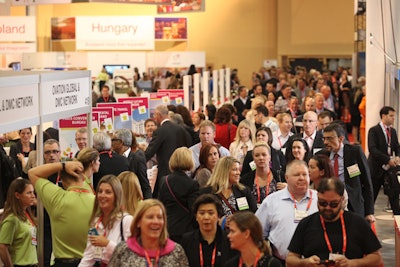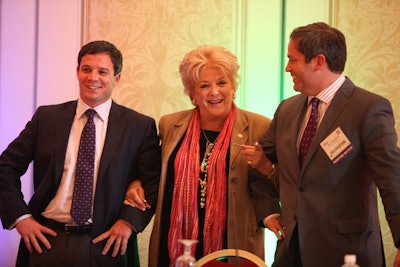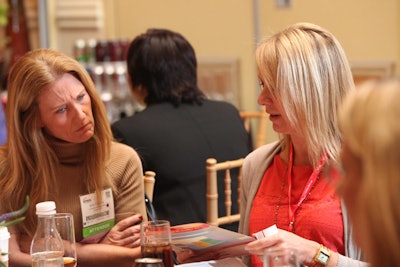The second edition of IMEX America, billed as the largest trade show in the U.S. for the global meetings, incentive travel, and event industry, kicked off Tuesday at the Sands Expo and Convention Center in Las Vegas with a buzzy show floor that felt lively and productive—as well as crowded—amid the palpable sense that business was really getting done there.
The event was 28 percent larger than its inaugural edition in October 2011, with 77 new booths and 2,413 exhibiting companies. Representation from almost every industry and geographic region grew at this year’s show, with increased interest from U.S. exhibitors alone expanding that area of the hall by nearly a quarter.
IMEX America also differentiated itself by the size of its hosted buyer program, which this year brought more than 2,000 such attendees—top-level planners and partners whose travel and accommodations are comped. About 1,700 general attendees were expected by the close of show, which wraps today.
The content of the vast education program underscored the topics most important to the industry right now. Here’s a look at what the industry’s big thinkers were talking about.
1. Social Media
Pasadena-based Building Blocks Social Media’s Elizabeth Glau hosted a social media session for planners while appropriately wearing a badge decked with her Twitter handle. She kicked off her session with an overarching statement that resonated amid the crowd: “The general premise of social media overall is not who you know, it’s who knows you.”
To that end, she gave tips for planners to amp up their presence, indicating that it’s time to put aside antiquated privacy concerns in favor of the business-building power of responsibly managed social media.
Her best practices include: following broadly; being gracious and thanking people who have retweeted or mentioned your brand; smartly and liberally using hashtags, including official event tags and industry tags like #eventprofs; offering to moderate a chat to set yourself up as an expert, or inviting another bona fide expert for a Q&A style chat; being responsive with the aid of mobile notifications; and paying it forward by following people back.
She further suggested making the most impactful statement you can in your bio and indicating which individual is handling the account. “The more human you can make it, the better,” Glau said. “The large companies that are doing this well make it personal. So if you tweet them, you feel like you’re having a conversation with a person rather than a company.”
In the end, Glau said, social media is essential, but it’s best when it serves as a face-to-face communication conduit. “The best scenario is when you follow someone on Twitter and go to an event and get to meet face to face for the first time.” She called that “the holy grail.”
2. Sustainability
Efforts to decrease the environmental impact of meetings and events continue, and a significant portion of the discussion in the Green Meeting Industry Council’s “Sustainability Hub” on the show floor was not just how to do it, but how to negotiate and communicate it.
It’s been debunked as a myth that environmentally friendly meetings are more expensive. The facts are that customers and investors are looking for a focus on sustainability, and that stakeholders know it can be a boon to brand reputation. Beyond that, Oracle vice president of marketing Paul Salinger—who says that his company recently saved $1.5 million through green event initiatives—said that the key is communicating the approach.
“Announce your intentions, because that’s what you’re going to get measured on. So later on you can come back and say, ‘Here’s what we said we were going to do, and here’s what we actually accomplished,’” he said. “The more we can incorporate sustainability into the event planning process, the [easier] it is to achieve these things. Publish your policy, plan, and materials on your Web site and maybe on your mobile app, and get your attendees involved. ... Then gather the data and distribute it in a report.”
Salinger, who is also president of the board of directors of the Green Meeting Industry Council, said that the enemy to green event initiatives is people’s erroneous sense that they work in vacuums. “Marketing can’t be separate from IT, can't be separate from logistics, can’t be separate from food and beverage," he said. "Incorporate everyone into the process by creating green teams. Pull people from different areas within your supply chain so that everyone’s working on the same goals and policy instead of across odds. It’s a better way of communicating if you’re all in the room together.”
Of course, the business objectives must be the bottom line for any event initiative, green or otherwise. So design a feasible hypothesis and try to change one thing at a time as part of an important continuum. “You cannot do it all at one time," he said. "This is a long process. You need to work from event to event. And then adapt as you go along, year over year. Commit, report, record, monitor, announce, and align. And then start the cycle all over. This is how we communicate sustainability.”
3. Technology and Apps
Apps for event and meeting pros were a major topic of discussion at the show. Jessica Levin of Seven Degrees Communications shared her favorite apps for increasing productivity. These include Dropbox for file sharing (“It’s bugless.”) as well as Box.net, Evernote (“No more stickies!”), Expensify for creating expense reports on the road, and TripIt for travel.
PSAV’s vice president of interactive services, Steve Short, presented ways to promote an event app in a session that originated from a white paper with partner QuickMobile.
First, he said, leverage the event’s Web site and communicate about the app in multiple times and ways, and then make sure the download process is simple. Focus on value instead of features for the end users. Broadcast on social media and on a variety of platforms. “You need to play in all these spaces because your attendees all play on different ones,” Short said.
You should also email all participants, get your speakers and exhibitors on board with promoting the app, and then post tons of signs and banners on site. To make things as easy as possible for folks, create short videos on how to use the app ahead of the event, and then provide support on site. “Think about creating that initial effort to demystify it. It feels less intimidating when you have a [virtual] finger demonstrating how to use the thing,” he said. “Lots of people are intimidated by even the technology they already own. It’s an exhilarating feeling for them when you help break down that barrier and they associate that feeling from you.”
4. Budgets and Costs
It’s worth noting that, despite the challenges that continue to face the U.S. and global economy, the IMEX America sessions weren’t overly focused on coping with shrinking budgets. Instead, the focus was on innovation, ideas, and activism.
Still, attendees at a small session on reducing expenses said they’re continually making efforts to control their costs—and getting creative in the process. Moderator Scott Craighead of the International Association of Exhibitors and Events suggested ways to make that happen: co-locate events; book during off-peak times; seek out strategic trade agreements; find a charismatic keynote just on the cusp of celebrity; and sign multiple-year agreements “if you have the luxury of knowing when your event is going to be every year—if you have a very stable organization.”
Of course, ways to save money can double as environmentally friendly benefits—like replacing signage with digital or even volunteer-human alternatives. “Having physical people replacing directional signs adds a nice, human element," he said. "It’s a creative and minimalistic way to reduce some of these [cost] structures.”
One attendee in the session offered that projection mapping helped convert her group’s general session space without having to rebuild the stage throughout the day. Another said she writes her own contracts to avoid a venue tossing in unwanted—and expensive—extras.
Moderator Craighead said budgets are an ongoing consideration, regardless of the state of the global economy. “Marketing and PR are always the first thing to get scrutinized,” he said. “Obviously, conventions are a huge revenue generator, so the more you can get out of it the better. See it as your own money. Take it personal when something’s costing you too much. Really pick apart your contracts. Sit on it. You’ll find something the next day.”
5. Industry Advocacy and Politics
The first Political Advocacy Forum by the U.S. Travel Association brought Las Vegas Mayor Carolyn Goodman, U.S. Travel Association C.E.O. Roger Dow, and Rossi Ralenkotter of the Las Vegas Convention & Visitors Authority for a discussion about their efforts to ensure that political representatives understand the economic value of the meeting industry.
“We’ve got to have data,” Dow said, sharing recent efforts to distribute quarterly data to stave off damage to the industry following such scandals as the General Services Administration’s recent, well-publicized troubles. Meetings advocates batted down an approach by some members of Congress to cut and freeze travel budgets, and they were present at both political conventions, doing work like walking congressmen through hotels to demonstrate the number of people employed there. “Those kinds of things send a strong message to lawmakers about how important this is. We need a call to action. Our work is far from over,” he said.
Mayor Goodman, a spirited speaker, also championed the importance of fierce advocacy within the industry. “The Republicans are not moving," she said. "The Democrats are not moving. If you want something done, figure out a way to do it yourself.” She also scored with some zingers about free publicity even in the midst of scandal. In light of the story of Prince Harry's partying-in-the-buff, for instance, she said, “My statement to the press right off the bat was, ‘What a bang for the buck are we going to get out of this. At no cost to us!’”
Joint Meetings Industry Council manager Rod Cameron echoed the importance of activism—and of communicating the industry’s overall heft. “We are the solution in many respects to the economic issues around the world, but we’re not seen as an essential part of that global recovery," he said. "As long as our image situation remains as it is, all the countries around the world know they’re all vulnerable to [the vilification of the industry] that happened in North America. So now they’re all motivated to do something about it. We need to come to a consensus way of moving forward.”
He said that government and community recognition is essential for investment and support. The goal, he said, is not “just to push our priorities, but to make ours the priorities of the audience we’re trying to talk to. People don’t have meetings to generate revenue for destinations; they’re having meetings to achieve the things they need to do. When we’re out there telling our story, we need to incorporate those values into what we’re saying. We need to behave like an industry as opposed to a group of various interests coming together when convenient if we want to be taken seriously.”
Indeed, he said, “The reality is this is an industry that’s driving the new economy.”
6. The Future of the Industry
In a session revealing Fast Future Research’s study findings on the next decade of the global meetings industry (an attendance-challenged session, thanks to a competing cocktail reception hosted by Meeting Professionals International), C.E.O. Rohit Talwar focused on trends in the industry and influences that will affect them going forward.
“The big picture is that we’re in a hugely turbulent world and we’re going to have several recessions in the next decade,” he said, rather grimly, but continued with a positive spin: “It’s going to put pressure on us to innovate.”
He gave an overview of the conditions that will affect meetings, like uncertainties of the Asian markets, increasing energy demand unmatched by supply, the developing ability of the Internet to provide multisensory experiences, and shrinking lead times.
Trends already underway in the industry include shortening events, shuttering unprofitable ones, co-locating, sharing risk and reward with the venue, incorporating more delegate content, merging previously competing events instead of cannibalizing them, and personalizing the learning experience for each attendee.
Another new model that’s becoming increasingly interesting to associations follows the concept, used by Groupon and other consumer discount platforms, in which the host can say, “At the end of two days [of offering tickets], if we have 50 delegates, the conference is on. If not, not. So I can go to my sponsors and say, ‘Hey, I already have the delegates.’ You change the risk profile.”
Talwar also described seeing the emergence of new skill sets for the industry in this new climate. Specialties that might have been previously folded in with the meeting planner’s role as a generalist will become their own roles—say, emerging titles like “digital strategist."
For venues, Talwar predicts they’ll move toward an infrastructure setup in which they can simply “plug and play to bring in what the customer wants, when they want it,” instead of broadly, and at great expense, installing every technology that becomes available.
Talwar laid out a list of imperatives for the industry going forward if it’s going to keep up and thrive. These include: distinguishing it from tourism as part of a knowledge-based industry; proving relevance and value; thinking and acting strategically; nurturing agility and flexibility; personalizing and deepening the learning experience; experimenting with business models and revenue streams; and developing tomorrow’s leaders and managers.
In short, the future of meetings depends on innovation.






















